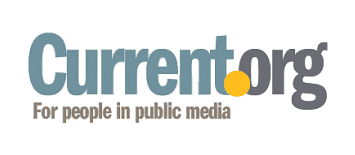
Debate series launched on pubradio comes to PBS
November 13, 2012
by Elizabeth Jensen
Intelligence Squared U.S., the nonpartisan public policy debate series airing on public radio and some public TV stations, is coming to PBS Plus in January, with Chicago’s WTTW as the presenting station.
Eight debates will be offered monthly through 2013 during non-pledge periods, starting Jan. 17. The first episode takes on the provocative motion “Better Elected Islamists than Dictators.”
The one-hour programs, which already air on more than 220 NPR stations, are condensed from recordings of the one-hour-and-45-minute debates moderated by ABC News correspondent John Donvan before live audiences in New York. The series launched in 2006 as a nonprofit initiative of the Rosenkranz Foundation.
“We felt that it was the right time to go national,” said Dana Wolfe, executive producer of Intelligence Squared U.S.
In an interview, WTTW’s top TV executive Daniel Soles described the program as “a very unique offering” for the system: “thoughtful intelligent discussions on issues that affect us, presented in a way that allows the audience to make up their own minds.”
Before each debate, members of the studio audience are polled on whether they agree or disagree with the motion. A second poll is taken at the debate’s conclusion to determine whether the debate team arguing for or against the motion “wins”; the side that changes the most minds is declared the victor. “No one is demonized, and you’re rewarded by being articulate and presenting a good case,” said Soles, WTTW senior v.p. and chief television content officer.
A debate recorded Oct. 10 during the Chicago Ideas Week festival, for example, demonstrated how the viewers’ opinions can shift. The pre-debate poll on the motion to ration end-of-life care showed support by 43 percent, opposition from 22 percent and 35 percent undecided. Following the debate, support nearly doubled to 81 percent, 12 percent were opposed and just 7 percent remained undecided.
An earlier version of the TV show aired on Bloomberg TV, and in the 2011–12 season the programs moved to WNET, WLIW and NJTV in the New York area. Select debates, different from those to be offered for broadcast through PBS Plus, also air on the digital World channel syndicated by American Public Television. All debates also stream live on FORA.tv and are archived on the Intelligence Squared U.S. website.
WTTW aired a handful of the shows in past seasons, including debates that were staged in Chicago, before deciding to sign on as presenting station for the PBS Plus distribution deal. “We’re really glad that after a few years these debates will finally be available to all the stations around the country,” Soles said. “I’m confident there is going to be a loyal following.”
The NPR audience has steadily grown, Wolfe said, noting that the podcast is currently averaging 100,300 monthly downloads, up from 85,052 a year ago. She said producers are also developing a website widget that will allow stations to invite their listeners and viewers to vote on debate motions in advance of local broadcasts.
Copyright 2012 American University